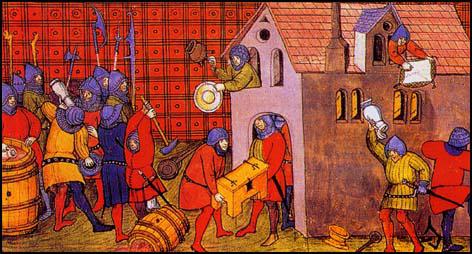The Hundred Years War
When William the Conqueror became king in 1066, he united England with Normandy in France. Under Henry II, English territory in France increased. The kings of England who succeeded Henry had difficulty holding on to this land and by the time Edward III came to the throne in 1327, England controlled only two areas in France, Gascony in the south, and Ponthieu in the north.
In 1328 King Charles IV of France died. Charles did not have any sons to succeed to the throne. His brothers were dead, although he did have a sister, Isabella, the mother of Edward III. Eventually, it was decided that Philip, a cousin of Charles IV, should become king of France.
Edward III claimed that because his mother had been the sister of Charles IV, he was the rightful king of France. Edward did not feel he was strong enough to take action straight away but in 1337, with King Philip threatening to take England's territory in France, Edward decided to declare war.
Edward now had the problem of raising an army. Under the feudal system, knights promised they would serve in the king's army during a war. However, in previous wars with the Scots, it had become clear that longbowmen were more important than knights on horseback.

Edward's officials toured the villages of England looking for skilled archers. It was usually left to the village to collectively decide who should go. It was also the responsibility of the village to pay for the equipment of those who went and to look after the families they left behind.
Sometimes, members of the village saw the recruitment of archers as an opportunity to get rid of local misfits. On other occasions it was the very poor who could not afford to bribe those making the decisions, who were sent. Some peasants were keen to go and willingly volunteered their services. They might have heard stories they could make their fortune in France by stealing from the local population. Others were attracted by the pay of 3 pence a day.
Fighting a war is very expensive. In the 14th century there were several ways of paying for a war. One way was to capture rich people from the opposing side and hold them for ransom. Towns and villages in occupied territories were often forced to pay 'tribute'. This was a kind of 'protection money' and in return for paying 'tribute' the soldiers promised not to burn down their homes. Edward also raised money for the war by imposing taxes on the English people.
